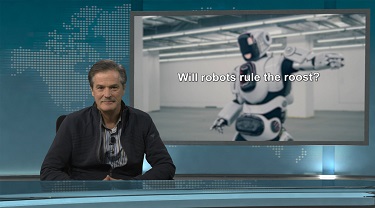Want to wreck a good party? Start a conversation about robots. Long gone are yesteryear’s horror films of robots running amok, destroying everything in their path. These days, they’re cool—they are sci-fi realized, wonder-working gizmos, a modern marvel. But as soon as this part of the party banter is over, the brows furrow and the tone gets more hushed. There’s a very real fear that these sophisticated devices are going to take over. Not just line jobs this time—all jobs. Should we be quaking or quickened by this technological wizardry?
The basic worry is nothing new. Similar fears have likely accompanied all major innovations in history. When manual tasks are displaced by mechanical ones, those with the displaced skills get understandably upset. The beginning of the industrial revolution is perhaps the most-documented case in point. Skilled cottage-industry workers were put out of business en masse by what William Blake referred to as “dark Satanic mills” that mechanized processes like weaving almost overnight. Luddites attempted to destroy the technology in hopes of a return to the way things were. As painful as the transition was for many, we could hardly imagine life today without that incredible leap forward. Basic goods were far more affordable, freeing up income for other uses, which in turn sparked the creation of other consumables that were previously inconceivable. Fears of advancement could have shackled future generations to a far lower standard of living than was actually experienced.
Since then, discussions of displacement have typically centered around labourers—the white-collar set were generally insulated. Not so today. The advent of artificial intelligence has created a 40th-floor freakout that even prominent tech scions are publicly participating in. The fear is that machines could be doing everything: producing goods and services, deciding on best processes, anticipating our needs and proactively making suggestions or even decisions, monitoring everything that goes on…and it all begins to sound frighteningly Orwellian. At the limit, gone would be the need for any human intervention.
While with today’s technology, the potential for major social disruption is conceivable, the “tech tale” is only half of the story. While we fear mass human displacement, the truth is that we are hardly awash in surplus people. Global demographics are abysmal; economies everywhere, developed and emerging alike, are struggling with slow, stagnant or sliding populations, and it is weighing heavily on future potential growth projections.
Economies that are already in the population-decline zone are a frightening sight: Japan’s population started to wane in the early 1990s, and its growth has languished ever since. Western Europe joined more recently, and its growth is starting to show Japan-like characteristics. If this path is inevitable as populations shrink, then China, Russia, other OECD nations and Canada have a bleak future to look forward to.
But is it inevitable? What if shrinking populations cleverly leveraged machines to perform functions that there are no longer enough people to do? Anyone that’s displaced is then retrained to perform work in areas where there are skill shortages (and there are plenty of examples of these all over the world right now). Clearly, it’s difficult to manage such a transformation perfectly, but the principle is there. Labour constraints mean that we actually need people-displacing technology to keep our economies growing at a decent rate—with the added bonus that machines enhance productivity growth, a long-standing bugbear of Western economies.
Fears of human displacement need to be tempered with two realities: first, we don’t have enough people to start with. Second, in a time of change, don’t discount human ingenuity; it ultimately outwitted the Satanic mills.

















